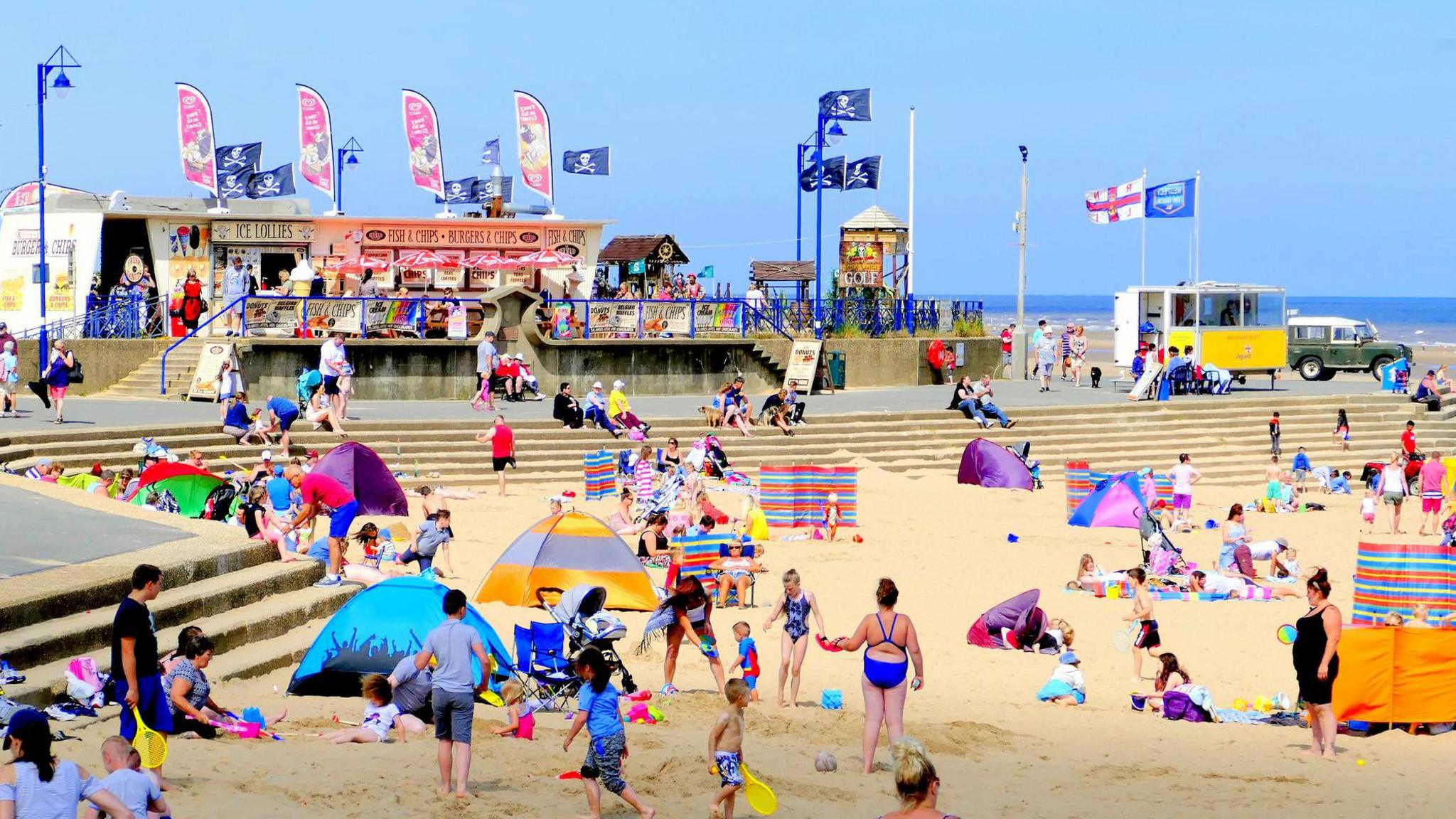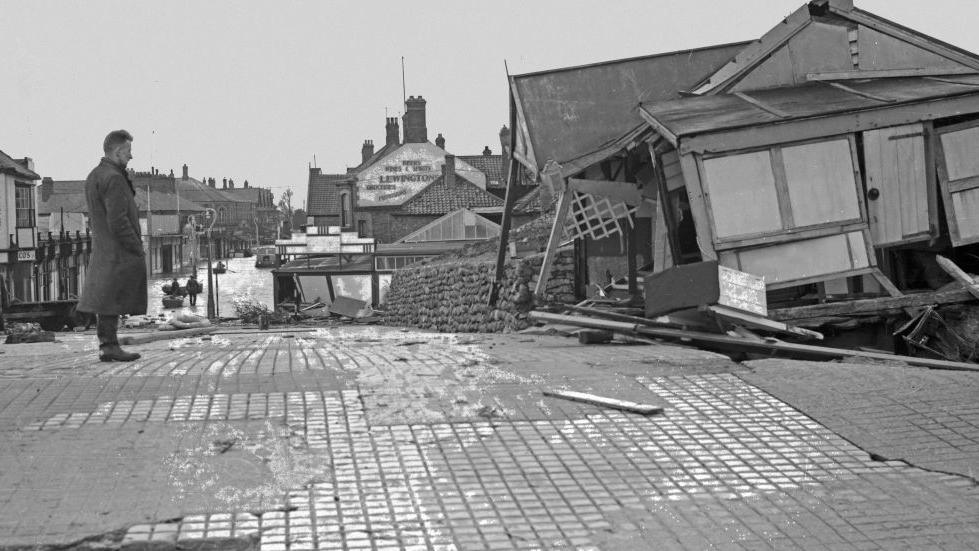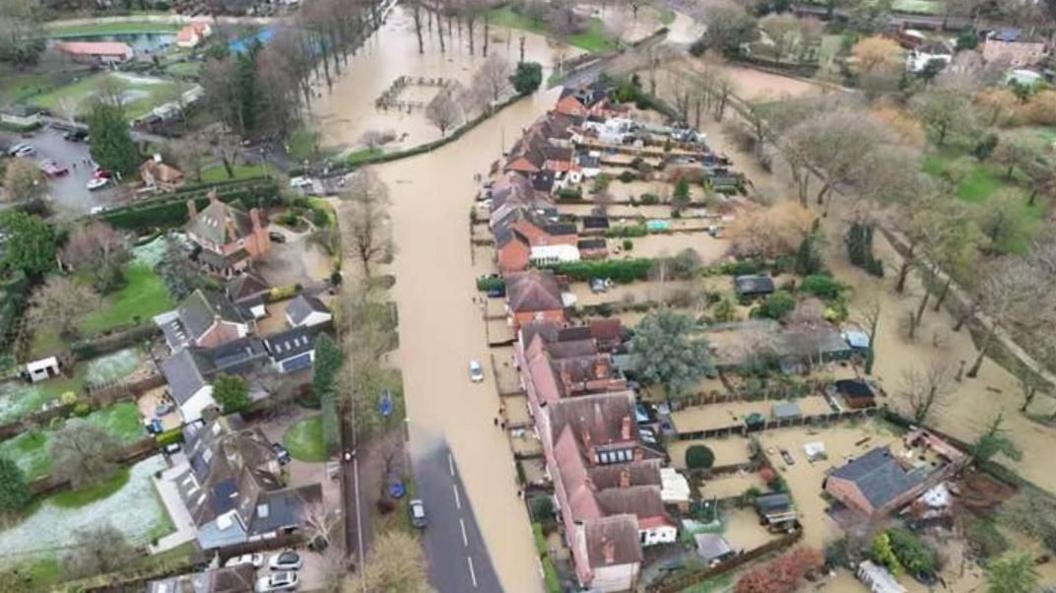Billions needed for coast's failing flood defences

Resorts such as Mablethorpe could be vulnerable to flooding within 20 years
- Published
Flood defences protecting the Lincolnshire coast will be "ineffective" by 2040 unless billions of pounds are invested, the Environment Agency (EA) has warned.
According to projections, a breach in the defences could leave the town of Mablethorpe under about 4ft (1.3m) of water and Ingoldmells, near Skegness, under about 5ft (1.6m).
A meeting of the county council's environment committee on Friday heard urgent action was needed.
Almost 90% of defences on a 30-mile stretch of coastline between Saltfleet, north of Mablethorpe, and Gibraltar Point, south of Skegness, were expected to fail within the next 20 years, councillors were told.
Deborah Higton, flood risk manager for the EA, told the committee it would take "billions" to replace all of the Lincolnshire coast defences.
"There is real urgency, even though 2040 feels like a long way in the future," she said.
The area, which was below sea level, was "completely reliant on flood defences" to protect 20,000 homes and 38,000 static caravans, she added.

Mablethorpe among communities hit by the Great North Sea flood of 1953
Councillor Tom Ashton (Conservative) told the committee local holiday resorts faced "stagnation and decline" without investment.
"If we don't get investment to secure our long-term security, that decline begins relatively quickly."
Councillors would also be forced to consider a "managed retreat" if funding could not be secured, a report compiled for the meeting stated.
The EA currently replenishes thousands of tonnes of sand along the Lincolnshire coast annually at a cost of between £10m and £15m.
However, Ms Higton said: "We are facing a future where the old ways of protecting the land will no longer be enough."
The agency, along with partners, said it hoped to draw up a masterplan by 2028, and secure funding and contracts by 2036.
Speaking after the meeting, Councillor Danny Brookes, the executive member for the environment at the Reform-led authority, told the Local Democracy Reporting Service: "It's worrying, but I'm glad to hear we're taking action.
"We're trying to get this into the council's corporate plan, and we will make sure this does get done."
It comes after Reform abolished the authority's flooding committee following its victory in May's local elections, despite other parties calling for it to be saved.
At the time, council leader Sean Matthews promised the new administration would work "longer and harder on flooding than ever before".
Stark warning
Analysis by Paul Murphy, Environment Correspondent.
This is a pretty stark warning from the specialists charged with defending Lincolnshire's coastal communities from the North Sea.
In recent years the Environment Agency has been revising a lot of its projections to take into account the impact of climate change and rising sea levels on our coastline.
The more the EA scrutinises existing flood defences, the more it is finding areas of vulnerability.
Thousands of people in the county live at or below sea level, many of them in static caravans nestled behind flood defences.
Projections of flood water up to 5ft deep in some places will be sobering for this population, many of whom are older and perhaps more vulnerable in an emergency.
There is mention too of "managed retreat" – the Whitehall euphemism for no longer defending against flooding and letting nature take its course. This could have a profound impact on the local economy.
The storm surge of 1953 claimed 43 lives along the Lincolnshire coastline and led to the construction of existing defences. The risks are more than just theoretical.
The government has already announced extra funding for Lincolnshire, including almost £11.3m to bolster defences between Saltfleet and Gibraltar Point.
Listen to highlights from Lincolnshire on BBC Sounds, watch the latest episode of Look North or tell us about a story you think we should be covering here, external.
Download the BBC News app from the App Store, external for iPhone and iPad or Google Play, external for Android devices
- Published27 May
- Published14 October 2024

- Published23 July
